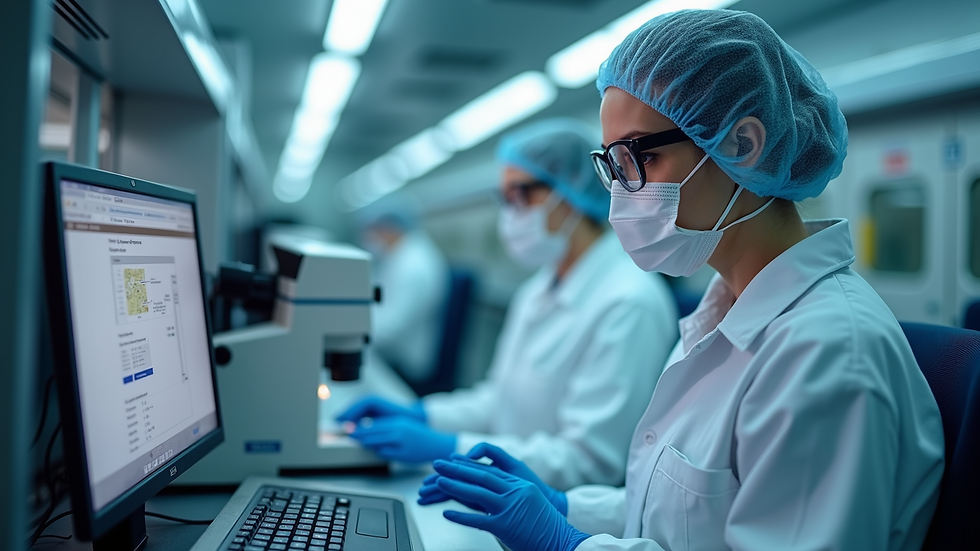How Mobile Labs Are Revolutionizing On-the-Go Testing
- mukeshk0
- May 19, 2025
- 4 min read
In our fast-paced world, efficiency and accessibility are pivotal. This is especially true in healthcare, where timely diagnosis can be lifesaving. Mobile labs are becoming a game changer in the healthcare sector, allowing for on-the-go testing and bringing essential medical services directly to communities. This blog post will explore how mobile labs are transforming the landscape of testing and diagnostics.
Understanding Mobile Labs
Mobile labs are self-contained, transportable units equipped with the necessary tools and equipment to perform various medical tests. They can offer services ranging from basic blood tests to complex genetic screenings. These labs can be set up in vehicles like vans or trucks, ensuring they are flexible and can reach remote areas where accessing traditional healthcare facilities can be challenging.

Mobile labs are perfect for responding to public health emergencies, conducting research, and providing preventive care. They excel at facilitating quick responses during outbreaks of contagious diseases like COVID-19, where testing is critical for monitoring and controlling spread.
The Advantages of Mobile Labs
Mobile labs come with numerous benefits that make them an attractive solution for both healthcare providers and patients.
Accessibility
One of the most significant advantages of mobile labs is their ability to reach underserved populations. Many communities lack easy access to healthcare services, especially in rural areas. By taking labs to the field, medical professionals can provide essential testing services that might otherwise be inaccessible.
With mobile labs set up in grocery store parking lots, community centers, or even schools, everyone can benefit from timely medical testing. This initiative not only promotes public health but also fosters community involvement in healthcare.
Speed
Time is vital when it comes to testing. Many traditional labs require samples to be sent back to central facilities, which can delay results. Mobile labs reduce this time significantly. Tests can often be processed on-site or within a short travel distance, leading to quicker diagnosis and treatment initiation.
According to a report from the Mobile Lab Association, on-site testing can reduce result turnaround time by as much as 50%. This speed can directly impact patient outcomes, especially in emergency situations.

Cost-Effectiveness
Operating a mobile lab can be more cost-effective than maintaining a brick-and-mortar lab. Overhead expenses such as rent and utilities are significantly reduced, allowing for lower testing fees. This financial approach benefits patients but also means healthcare providers can offer more services without risking financial loss.
Some mobile lab services are offered at no cost to the community, funded through government initiatives or partnerships with non-profit organizations. This model opens up possibilities for free testing in schools or during large community events.
What is an example of a state of the art?
An example of a state of the art mobile lab is the one operated by the nonprofits involved in disaster response. These labs often feature advanced technology, such as:
Onboard laboratory equipment capable of performing PCR tests for infectious diseases like COVID-19.
High-throughput sample processing systems that can handle specimens from hundreds of individuals per day.
Telemedicine capabilities, allowing healthcare providers to consult with specialists remotely while conducting on-site tests.
By utilizing such cutting-edge tools and technology, these mobile labs can efficiently respond to urgent health crises.

Patient Experience in Mobile Labs
The patient experience matters greatly in healthcare. Mobile labs simplify the process for patients, often creating a less intimidating environment. With no need for appointments or long waits, everyone can walk in and receive services in a timely manner.
Patients often appreciate the convenience of receiving tests within their communities. Mobile labs can serve as a one-stop-shop for various health checks, including blood pressure, cholesterol, glucose levels, and more. This all-encompassing approach encourages regular health monitoring, thereby improving overall public health.
Having the ability to conduct these tests in familiar, community-oriented locations not only improves comfort but also reduces anxiety. This avenue is particularly crucial for vulnerable populations who may feel intimidated by traditional healthcare settings.
Challenges Facing Mobile Labs
Despite their many benefits, mobile labs are not without challenges.
Regulatory Hurdles
Regulations governing laboratory testing can be complex, and mobile labs often face challenges in complying with local health codes, federal laws, and accreditation standards. This uncertainty can slow down the process of getting mobile labs operational in different jurisdictions.
Equipment Limitations
While mobile labs can perform many tests, they might not have the same scope of testing capabilities as traditional labs. Limited space can also restrict the number of personnel onboard, potentially slowing down the testing process if there’s high demand.
The Future of Mobile Testing
The future looks bright for mobile labs as technology continues to advance. Innovations such as portable devices capable of conducting complex analyses and artificial intelligence systems for data management are paving the way for mobile labs to become even more efficient.
Additionally, partnerships between healthcare providers and technology firms are likely to increase, creating more sophisticated, adaptable mobile labs. This collaboration can lead to cutting-edge functionalities, such as integrated telehealth services and enhanced data tracking capabilities.
Moreover, during public health emergencies, the importance of mobile labs is undeniable. They play a crucial role in testing and managing outbreaks, providing immediate care to populations.
In summary, mobile labs are revolutionizing on-the-go testing, making healthcare more accessible and efficient. They present significant advancements in the healthcare sector by combining convenience, speed, and community engagement, reinforcing the need for continued investment in these valuable resources.

As a takeaway, if you or your organization is considering the implementation of mobile lab services, research partnerships that may offer technology and operational support, ensuring that your mobile lab is equipped to provide essential testing. As we move forward into a future where healthcare needs to be both modern and accessible, mobile labs will undoubtedly be at the forefront of these transformations.


